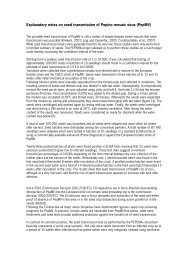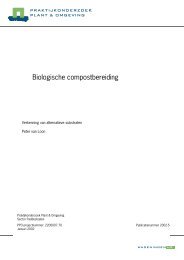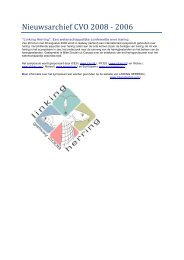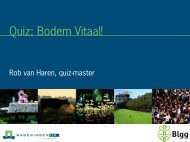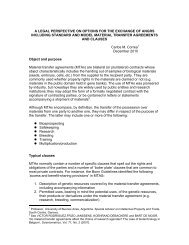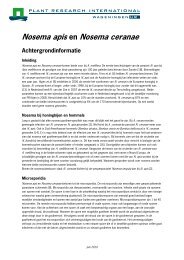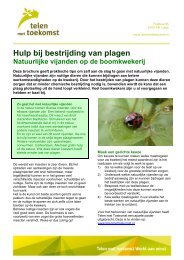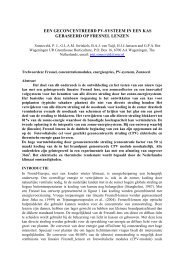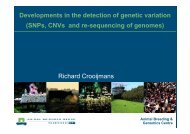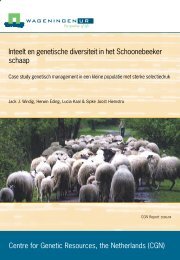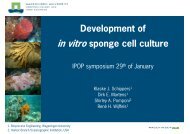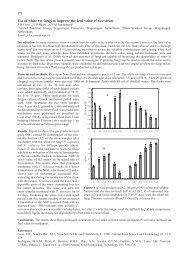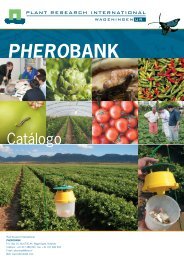When the going gets tough... - Wageningen UR
When the going gets tough... - Wageningen UR
When the going gets tough... - Wageningen UR
- No tags were found...
Create successful ePaper yourself
Turn your PDF publications into a flip-book with our unique Google optimized e-Paper software.
news<strong>Wageningen</strong> <strong>UR</strong> should have <strong>the</strong>courage to be more open to criticalreflection and listen to <strong>the</strong> ‘dissidents’within <strong>the</strong> organization.That was <strong>the</strong> key message that educationand research director AbGroen put across in his farewelllecture on 24 January.Groen was not afraid to reflecton <strong>the</strong> directors present in <strong>the</strong>room. For instance, he said it was‘hilarious’ that university directorsand researchers advocate autonomyand self-monitoring ‘in view of<strong>the</strong> recent failures in self-monitoringin <strong>the</strong> case of directors’ payand scientific fraud.’Such contradictions raise <strong>the</strong>suspicions of <strong>the</strong> general public.Groen thinks that you can onlychange this by paying more attentionto <strong>the</strong> individual motivationsof students and researchers. He isagainst <strong>the</strong> abolition of <strong>the</strong> basicgrant, selective admissions andsetting up so-called honours programmes.Such measures are turning<strong>the</strong> universities into ‘Humboldtinstitutions’ - ivory towers -whereas <strong>the</strong>y should be developinginto networking knowledge institutions.Universities also need to makesure <strong>the</strong>y do not lose contact with<strong>the</strong> students. ‘The biggest challengefor universities now is to beaware of <strong>the</strong> trends among youngpeople.’ He mentions <strong>the</strong> use of ITas an example. ‘A lecturer found itirritating that students were messingaround with Facebook andTwitter during practicals. I don’tagree. Sixty percent of new studentshave mobile internet. So itshould be <strong>the</strong> o<strong>the</strong>r way around -<strong>the</strong> lecturer should start tweetingwith <strong>the</strong>m instead. <strong>Wageningen</strong>University should invest more in<strong>the</strong> use of social media in <strong>the</strong> learningenvironment so you are givingenough support to <strong>the</strong> ITtrendsetters among <strong>the</strong> students.’That is why you need a structuraldialogue between <strong>the</strong> universityand its students ‘starting with <strong>the</strong>acknowledgement that young peopleshould have a say,’ argues Groen.He feels consultations between <strong>the</strong>board and <strong>the</strong> student council aretoo much of a ‘ formal exercise’ without‘<strong>the</strong> intrinsic willingness todiscuss key policy decisions.’The university directors shouldorganize such questioning of itspolicy <strong>the</strong>mselves, says Groen, whoacted as an advisor to <strong>the</strong> board for<strong>the</strong> past seven years. ‘Make sure<strong>the</strong>re is sufficient critical reflection.’He says managers become lazyif <strong>the</strong>y aren’t confronted with resistanceor dissidents, or else <strong>the</strong>ythink <strong>the</strong>y can get away with anything.‘A strong organization isprepared to make room for dissidentsbecause <strong>the</strong>y improve <strong>the</strong>quality of <strong>the</strong> decision-making process.’According to Groen, it is thosevery critics who throw a differentlight on matters and who canexpose <strong>the</strong> weak points in policychoices. ‘We must have <strong>the</strong> courageto have honest differences ofopinion. There needs to be a culturegrounded in commitment andcreativity in which staff feel safe totake risks and take action. Resistanceis about voicing your own views andseeking links with o<strong>the</strong>rs based onyour own sense of worth.’ ASAb Groen has spent more than30 years at <strong>Wageningen</strong> University,first as a student and <strong>the</strong>nas a lecturer in <strong>the</strong> Animal Breedingand Genetics group and laterhead of teaching within AnimalSciences. He has spent <strong>the</strong>last seven years as director ofCorporate Education, Research &Innovation at <strong>Wageningen</strong> <strong>UR</strong>.As of 1 February, he will bechairman of <strong>the</strong> board of Helicon,a centre for pre-vocationaland vocational agricultural education.RESO<strong>UR</strong>CE — 31 January 2013



